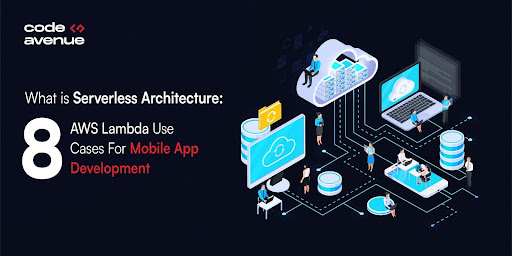Introduction
Serverless architecture leads the transformation of the mobile app ecosystem which shows rapid development. Profitable business operations in 2023 depend on scalable and cost-efficient solutions because the worldwide mobile user base exceeds 7.1 billion along with 255 billion app downloads anticipated this year.

AWS Lambda provides mobile apps with a serverless computing solution that has dramatically transformed their backend function. The code execution mechanism in Lambda differs from conventional servers because it activates only upon trigger events thereby minimizing operating expenses and enhancing operation speed.
Companies employing serverless systems achieve 60% reduced expenses for their operations when compared to conventional cloud-based approaches. The demand for serverless adoption has expanded by 25% during 2023 to show its vital role in contemporary application development practices.
List of 8 AWS Lambda Use Cases for Improving Mobile App Development
-
Real-time Data Processing for Dynamic App Experiences
Use Case:
Today’s mobile apps need live updates to support functions such as chat messaging along with payment processing and tracking by GPS. AWS Lambda architecture diagram uses the integration with Amazon Kinesis and DynamoDB Streams to analyze streaming data in real-time which instantly updates user interfaces.
How it Works:
- The technology enables location data processing for online ride-sharing applications in real-time.
- The system updates the ride status instantly through Lambda after it receives a change in driver GPS coordinates.
- Implementing AWS Lambda with WebSockets or API Gateway provides latency-free real-time experiences to users.
Competitive Edge:
The swift execution speed of AWS Lambda enables it to surpass traditional server systems at processing instant data. Uber and Lyft implement the same architectural designs for their live tracking functionality and instant messaging services.
-
Scalable Push Notifications for User Engagement
Use Case:
Push notifications serve as architect tools of engagement for users but maintaining them across large user bases presents managerial complexities and increased cost of aws lambda. AWS Lambda serves as an automatic solution for pushing notifications to applications that have substantial user populations.
How it Works:
- The combination of AWS Lambda and Amazon SNS (Simple Notification Service) enables push notifications delivery.
- The system leverages Lambda to process event triggers and sends real-time notifications to thousands or millions of users.
- Lambda’s architectural engineering automatically adjusts its capacities to match the demand so high traffic volumes do not impact performance quality.
Competitive Edge:
Research indicates that customized push messages improve app interaction by 88% when combined with AWS Lambda which delivers notifications efficiently with accessible AWS lambda pricing.
-
Automated Backend Workflows offer Seamless App Operations
Use Case:
AWS Lambda implements robotic process automation like chef architecture to simplify repeated backend operations which include mobile application database maintenance along with analytic processing and order management functions. There are multiple tutorials on how to deploy code in AWS lambda efficiently.
How it Works:
- The e-commerce application sets off a Lambda function as soon as users place an order through its platform.
- Lambda performs both database updates and warehouse notifications and delivers confirmation emails to users.
- The system maintains a log of analytics information like aws service catalog that becomes valuable for future analysis.
Competitive Edge:
AWS architecture application’s scalability benefits from Lambda because it cuts backend processing durations by 40%. Amazon together with Shopify realize millions of transactions through their equivalent automation processes.
-
Image and Video Processing for Media-Intensive Apps
Use Case:
The three main functionalities of media-intensive applications like social media and e-commerce platforms and on-demand video services demand image compression, format conversion, and facial recognition abilities. Via AWS Lambda users can achieve automated management of these processes.
How it Works:
- The user saves images and videos in S3 buckets, activating AWS service status functions.
- Face detection through Amazon Rekognition and video encoding by AWS Elemental MediaConvert while Amazon S3 Glacier handles archival storage.
- Optimizing the processed media for mobile devices leads to faster load times which results in better app performance.
Competitive Edge:
Serverless pipelines within Instagram and TikTok operate similarly by processing millions of visual content daily. The platform AWS Lambda provides both quick response times together with reduced storage expenses.
-
Secure Authentication and User Management
Use Case:
The growing occurrence of data breaches requires mobile apps to implement advanced functionalities for authentication together with access control capabilities. AWS Lambda lets users implement a security boost through its integration with AWS Cognito.
How it Works:
- The sign-in process for users enables AWS Cognito to trigger a Lambda function which executes secure authentication procedures.
- AWL Lambda implements MFA procedures as well as both role-based access frameworks and JWT token authentication protocols.
- The system maintains real-time logs of unauthorized login attempts which helps decrease security vulnerabilities.
Competitive Edge:
The use of AWS Lambda allows applications to comply with GDPR and HIPAA standards so users obtain better security. Apps like Dropbox and Tinder implement similar authentication mechanisms.
-
AI-Powered Chatbots for Seamless Customer Support
Use Case:
The development of customer support programs depends heavily on mobile applications where AI-based chatbots increase user contact efficiency. Building the architect of AWS Lambda requires Amazon Lex to unite with lambda and deliver chatbots that understand natural speech inquiries and reply instantly.
How it Works:
- Users present their questions through the chatbot interface that exists inside the architecture apps.
- The natural language input from Amazon Lex activates a Lambda function through AWS Lambda.
- The requested data travels from the database to Lambda then the platform generates and returns a precise response.
Competitive Edge:
AWS Lambda-powered chatbots using AI and continuous availability reduce operational expenses by 30% while improving user satisfaction levels. Apps like Bank of America and Duolingo leverage similar chatbot technology.
-
Fraud Detection and Transaction Monitoring
Use Case:
Real-time fraud detection through AWS Lambda becomes essential for applications like e-commerce and finance to stop illegal transactions. AWS security services operate transaction monitoring at speed and security through automated processes that avoid human oversight.
How it Works:
- Lambda immediately receives transaction details after a user makes a payment request.
- The record goes to Lambda which performs a comparison against stored fraud detection models in Amazon SageMaker.
- A verification request for checking authenticity might be received by the user.
Competitive Edge:
AWS Lambda handles fraud detection requests which decreases financial loss and builds trust with customers. PayPal together with Stripe implements fraud detection processes that protect their transactions.
-
Event-Driven Content Personalization
Use Case:
The delivery of customized information through entertainment and e-commerce applications as well as news platforms leads to increased user participation. User preferences drive AWS managed services to dynamically customize the content displayed to customers.
How it Works:
- The process begins when a user engages with the app which activates a Lambda function.
- Lambda retrieves user behavior data from DynamoDB tables to apply machine learning models in the analysis process.
- Lambda uses its acquired insights to customize home feed suggestions that appear in the application.
Competitive Edge:
The delivery of personalized content elevates conversion rates by approximately 80%. AWS Lambda delivers automatic and efficient content delivery for streaming platforms like Netflix and Flipboard.
Conclusion
The mobile app development landscape faces a change due to how AWS Lambda delivers scalable cloud operations with both superior efficiency and cost-effectiveness. AWS Lambda emerges as a critical and disruptive solution that transforms mobile app scalability together with efficiency among cloud-computing businesses.
Want to supercharge your mobile app with AWS Lambda? Code Avenue specializes in cutting-edge serverless solutions. Let’s build the future together, contact us today!
FAQs
What is AWS Lambda, and how does it benefit mobile app development?
AWS Lambda works as a serverless computing service that runs programs automatically based on events while cutting down costs and enabling application expansion.
How does AWS Lambda enhance mobile app security and authentication?
Through integration with AWS Cognito AWS Lambda delivers secure login features and real-time MFA authentication as well as unauthorized access detection capabilities.
How does AWS Lambda help detect fraud in mobile transactions?
Machine learning models embedded in AWS Lambda analyze transactions in real-time to detect behavioral patterns that indicate fraud which helps companies stop fraudulent activities.
Can AWS Lambda improve push notification performance?
Yes, user push notifications can be transmitted to millions of users with real-time scalability through AWS Lambda in conjunction with Amazon SNS without dedicated server requirements.
Can AWS Lambda support AI-powered chatbots in mobile applications?
Yes, AWS Lambda enables customers to build intelligent chatbots using Amazon Lex for instant natural language query management which enhances their support capabilities.

-
Augmented Reality (AR) and Virtual Reality (VR)
Virtual and 3D-Powered Hotel Tours
Before making their reservations hotel guests can use virtual reality tools to examine rooms and hotel facilities through a 3D tour. With this technology, guests can receive higher satisfaction while the booking rates have seen a 20% increase in numbers by hotels implementing this.
AR Navigation for Large Resorts
AR-powered wayfinding mobile applications offer a complete guide to hotel visitors through the complex routes of large hotels thus providing superior service to their guests. This proved to increase customer experience while increasing their expectations.
-
Online Reputation Management through Feedback
Real-Time Guest Feedback through the App
Through app functions, hotel guests can provide instant ratings about their services while hotels react immediately to respond to complaints through hotel ratings insight. Organizations that handle customer opinions immediately achieve a 16% boost in positive assessment ratings.
Social Media Integration for Brand Loyalty
The seamless integration of Instagram and TikTok in these applications enables guests to instantly share their experiences leading to brand visibility enhancement. This also allows other users interested in your services to instantly find your brand and services.
How Can Hospitality Businesses Implement These Technologies
-
Choose the Right Tech Stack
Academia World offers cloud-based solutions like cloud bed that help hospitality businesses operate efficiently and cut down their infrastructure expenses simultaneously. Real-time system updates coupled with third-party app integration and accessible customer management systems are key benefits.
Example:
The cloud-based property management system from Marriott allows them to maintain worldwide operations through automatic reservations and individualized guest service solutions.
-
Invest in the Training of Employees
Digital tool usage requires proper training of employees to achieve technology adoption success. Customers should prioritize training that educates employees about property management systems together with automated booking platforms and AI-driven customer service applications.
Example:
Staff at Hilton undergo specialized training to operate the AI chatbot system including “Connie” which enables them to process routine inquiries better while maintaining guest service quality.
-
Focus on Security and Compliance
Hospitality work apps need to adhere to GDPR and PCI DSS standards due to rising cybersecurity threats. The protection of customer data requires businesses to establish end-to-end encryption standards together with automated audits and processing systems that ensure data security.
Example:
Hyatt protects both customer details and payment transactions through systems that combine multiple password checks with instant security alerts.
-
Leverage Data for Improvement
Using data analytics enables hospitality companies to study guest conduct and adapt their pricing system as well as their service delivery. Through AI analytics guests receive customized service interactions while businesses obtain predictive maintenance capabilities.
Example:
Guest preferences on Airbnb drive machine learning algorithms that generate customized recommendations along with optimized pricing structures to boost user satisfaction.
What Are The Benefits Of Digital Apps For Hospitality Businesses
- Enhanced Guest Experience- The mobile app system simplifies all booking procedures and check-in protocols while letting guests make service demands effortlessly. The streamlined process produces higher guest satisfaction.
- Increased Operational Efficiency- Mobile apps enable hotel staff to automate regular hotel procedures from room cleaning to repair ticket processing to employee assignment tasks. This automatic system ensures efficient daily operations.
- Improved Revenue Management- Apps leverage data analytics together with AI to develop optimal pricing plans through analysis of market trends alongside hotel occupancy rates and customer demand patterns.
- Stronger Customer Loyalty- Hospitality applications build customer retention through created promotional programs special rewards and member-exclusive pricing options. Push notifications and special discounts increase booking and extend customer loyalty.
- Real-Time Communication- Digital platforms create instant message capabilities for staff members which boosts their efficiency and speeds up their communication and response times. It speeds up issue resolution and operational management tasks.
- Data Analytics and Insights- The data mining capabilities of applications enable companies to obtain insights about consumer preferences as well as user behavior patterns with direct feedback records.
Conclusion
The era of 2025 necessitates hotels to adopt hospitality apps as essential tools for function. Through AI-driven chatbots and blockchain payments digital transformation enhances guest experiences and makes procedures more efficient and profitable.
Your hospitality business needs next-generation app solutions to redefine operations. Partner with Code Avenue for seamless, AI-powered hospitality apps. Contact us today!
FAQs
How do digital key systems improve hotel security and convenience?
The implementation of digital keys through smartphones creates secure entry access into rooms without requiring physical keycards.
What is the impact of mobile app systems on the hospitality industry?
AI and real-time communication and automation integrate into mobile apps to boost service efficiency while transforming both guest service and operational management.
What are the different types of guest management tools used in hospitality?
Guest management tools commonly used are property management systems (PMS), customer relationship management (CRM) software, AI-powered chatbots, mobile booking apps, self-service kiosks, and smart room automation systems.
What are the benefits of integrating AI into guest management?
Through AI analysis hotels can identify guest data patterns for preference prediction and automated customer engagements as well as maximize profits through optimized pricing methods to deliver improved satisfaction.












They were willing to walk me through their ideas and provide suggestions when I wasn't sure about something.
Marcus Gitau Founder, Kumea, Agriculture Industry